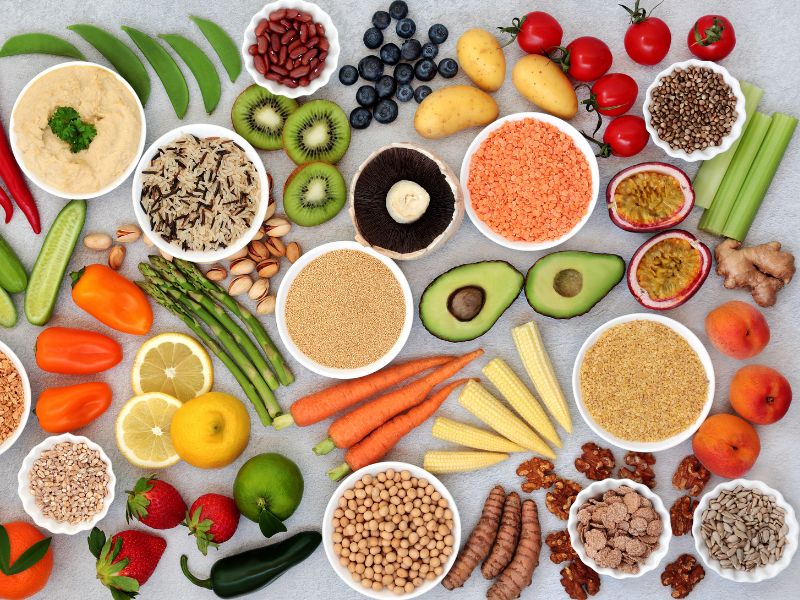Vegan diets are having a moment. From trendy plant-based burgers to dairy-free everything, more people are leaning into plants for their meals. But what does “vegan” really mean, and is it actually healthy for everyone? Let’s break down the benefits, risks, and the way this lifestyle can affect people with chronic conditions like diabetes and food allergies.
What Is a Vegan Diet?
At its core, a vegan diet avoids all animal products. That means no meat, poultry, fish, dairy, eggs, or even honey. Instead, the focus is on plant-based foods like fruits, vegetables, grains, beans, nuts, seeds, and plant-based alternatives such as almond milk or tofu. Think colorful salads, hearty bean chilis, creamy nut-based sauces, and grain bowls packed with roasted veggies.
For some, the choice is about health. For others, it’s tied to ethics or the environment. No matter the reason, the number of people choosing a vegan diet continues to grow.
The Benefits of a Vegan Diet
Research shows that well-planned vegan diets can offer some impressive health benefits:
- Heart health: Plant-based diets are typically lower in saturated fat and cholesterol, which can reduce the risk of heart disease and high blood pressure.
- Weight management: High-fiber foods like beans and vegetables can help with maintaining a healthy weight and feeling fuller longer.
- Diabetes support: Studies have shown vegan diets may improve insulin sensitivity and lower A1C levels in people with type 2 diabetes.
- Nutrient-rich foods: With plenty of fruits and vegetables, vegan diets are often packed with antioxidants and vitamins that support immune function.
The Risks and Challenges
Vegan doesn’t always mean “automatically healthy.” Here are some common challenges:
- Nutrient gaps: Important nutrients like vitamin B12, iron, calcium, and omega-3s are harder to get from plants alone. Without supplements or fortified foods, deficiencies can develop.
- Protein balance: While plants do contain protein, not all plant sources provide all essential amino acids. Pairing foods (like beans and rice) is important.
- Highly processed foods: Vegan substitutes can be loaded with sodium and additives, so it’s still important to read labels.
How Vegan Eating Impacts Chronic Conditions
Diabetes and Vegan Diets
Vegan diets can be particularly helpful for those with diabetes. Multiple studies show that plant-based eating may improve blood sugar control, enhance insulin sensitivity, and even reduce the need for diabetes medications in some cases. That said, carb-heavy choices like pasta or bread, which are staples of a vegan lifestyle, can still cause sugar spikes.
If you have diabetes and are considering a vegan diet, it’s important to work closely with your healthcare provider and continue monitoring your blood sugar levels regularly. If you rely on diabetes testing supplies, respiratory medications, or other medical supplies, America’s Best Care Plus can help ensure you stay fully stocked as you explore dietary changes.
Vegan Diets and Food Allergies
A vegan diet can be both a blessing and a challenge for people with food allergies. On one hand, going vegan automatically eliminates dairy and eggs — two of the top allergens, especially for children. If you or your child has a milk or egg allergy, a plant-based diet makes allergen avoidance much simpler.
On the other hand, many vegan protein sources come from foods that are also common allergens: soy, nuts (almonds, cashews, walnuts), peanuts, seeds (sesame, chia), and wheat (found in seitan and many processed vegan foods). If you have allergies to any of these, navigating a vegan diet requires extra attention. That could mean swapping in allergen-free alternatives like oat milk or chickpea butter. You can also talk to your allergist about immunotherapy, like our sublingual allergy drops, to reduce allergy symptoms over time.
Should You Try Going Vegan?
If you’re considering a vegan diet, here are a few things to keep in mind:
- Focus on whole foods (vegetables, fruits, beans, whole grains, nuts, and seeds) rather than relying heavily on processed vegan meat and cheese substitutes. While these products can be convenient, they’re often high in sodium and lack the nutrients found in whole plant foods.
- Supplement wisely. At minimum, you’ll need a B12 supplement, and depending on your diet and lifestyle, you may also benefit from vitamin D, omega-3, and iron.
- If you have a chronic condition like diabetes, kidney disease, or food allergies, talk to your doctor before making major dietary changes. A vegan diet can be beneficial for many health conditions, but it’s important to adjust medications and monitoring as needed.
A vegan diet can be a healthy, sustainable way of eating that offers real benefits for heart health, blood sugar management, and overall wellness. But like any diet, it requires planning, knowledge, and a little creativity, especially if you’re managing food allergies or chronic conditions.
This National Vegan Month, whether you’re going fully plant-based or just adding more vegan meals to your week, the key is to stay informed, listen to your body, and make choices that support your long-term health.
Related Readings:
National Junk Food Day: Unwrapping the Truth About Ultra-Processed Foods

